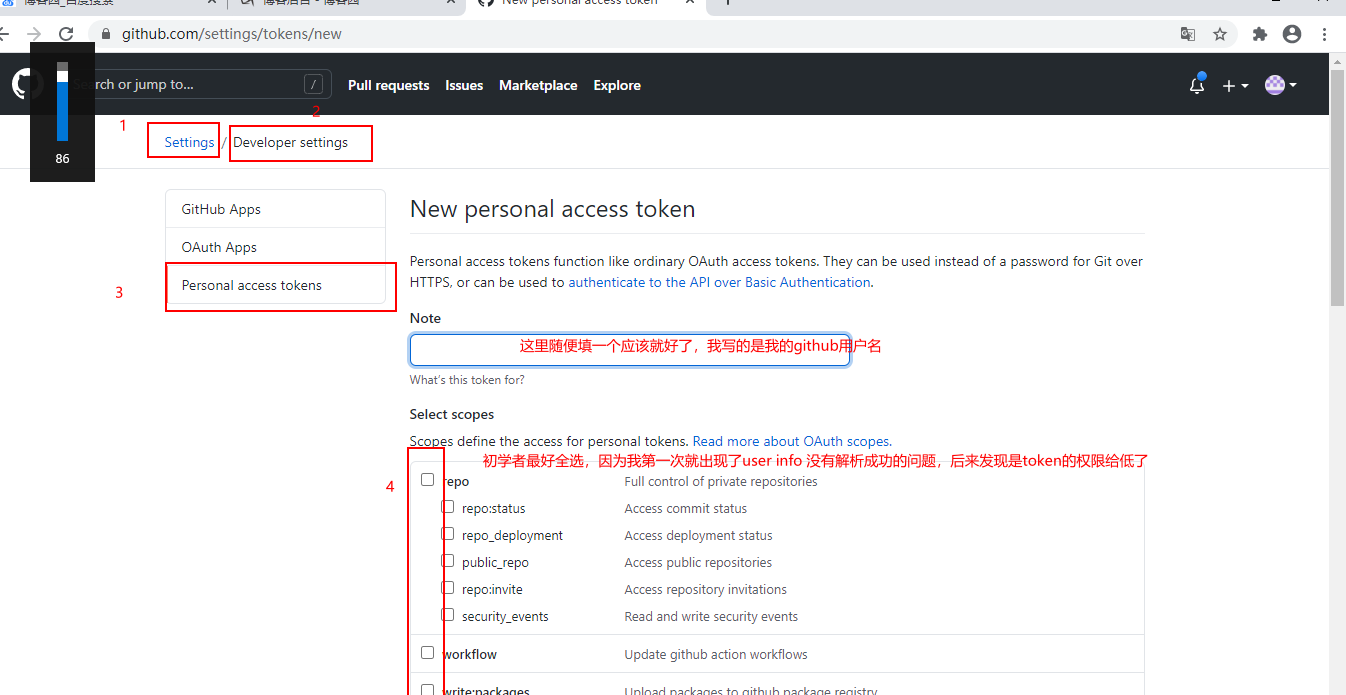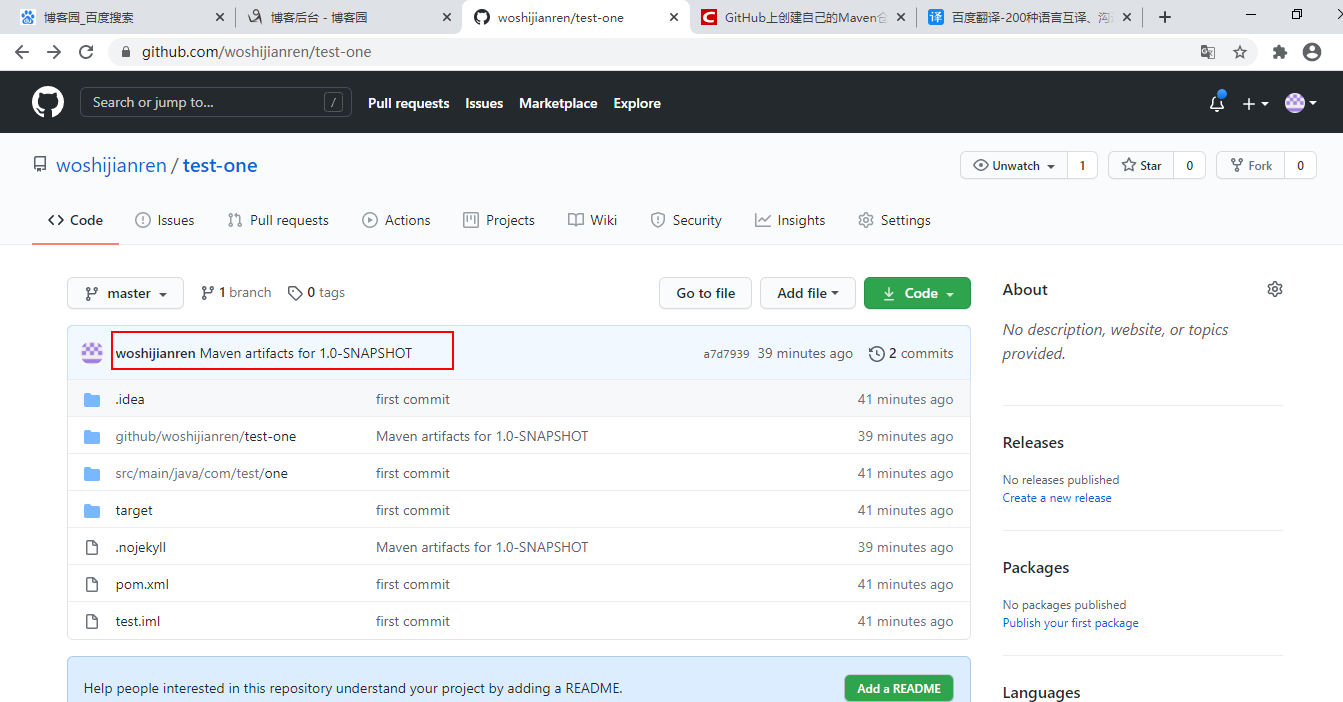背景:可以种报表下载的业务写了快半年了,其中有很多东西,我已经快自己总结出一套可以直接套用的Api了,目前准备再花些时间将一些细节和一些其他功能搞定,就自己做个Maven,让自己可以随时调用。昨天花了半天时间,将Maven搞定了。
我会将我所有的操作和配置都描述一下,唯一不会帖出来的东西我github上面,也就是下面说的第一步的生成的token,理论上参照着来应该是可以成功的。
一共需要配置三处
1.github的setting
2.本地Maven的setting
3.准备当作依赖的项目的pom.xml
github的setting设置两处:
1.生成一个token。setting->Developer settings->Personal access tokens->创建一个token,初学者最好给予这个token全部权限,减少后期报错,出现自己不懂的问题。
2.将用户名填写完整。 setting->Profile->Public profile->Name->将Name填写一个值,不然会出现错误,我写的是我的github的用户名
备注:忘了,其实还有一部,创建一个github的仓库,毕竟是要将本地代码上传到github作为Maven,项目名称统一一下。
本地Maven的setting,我直接用的IDEA自带的Maven,没有另外去官网下载Maven。
3.添加两个标签。
<server> <id>github</id> <username>woshijianren(这里我写的是我的github用户名,当然,我第二部设置的name也是这个,生成token的note也是这个,我认为应该是github账号的用户名)</username> <password>第1步生成的token,而不是你的github账号的密码</password> </server>
<activeProfiles> <activeProfile>github</activeProfile> </activeProfiles>
后面会贴出全部配置内容,除了password
要做成maven的项目的pom.xml配置。需要注意的几点:这个是做成Maven给其他项目用的,所以不要搞成Spring-boot可以直接运行的web项目
4.直接看代码吧,我会把配置贴出来,加上备注。
<?xml version="1.0" encoding="UTF-8"?> <project xmlns="http://maven.apache.org/POM/4.0.0" xmlns:xsi="http://www.w3.org/2001/XMLSchema-instance" xsi:schemaLocation="http://maven.apache.org/POM/4.0.0 http://maven.apache.org/xsd/maven-4.0.0.xsd"> <modelVersion>4.0.0</modelVersion> <!-- 这个是到时候使用的maven的坐标--> <groupId>github.woshijianren</groupId> <artifactId>test-one</artifactId> <version>1.0-SNAPSHOT</version> <properties> <java.version>1.8</java.version> <!-- 这个和本地Maven的setting有关联,如果之前和我一样,这里直接这样写就行了--> <github.global.server>github</github.global.server> </properties> <dependencies> <dependency> <groupId>cn.hutool</groupId> <artifactId>hutool-all</artifactId> <version>5.4.7</version> </dependency> <!-- https://mvnrepository.com/artifact/com.google.code.gson/gson --> <dependency> <groupId>com.google.code.gson</groupId> <artifactId>gson</artifactId> <version>2.8.6</version> </dependency> <dependency> <groupId>org.projectlombok</groupId> <artifactId>lombok</artifactId> <version>1.18.16</version> </dependency> </dependencies> <build> <plugins> <!-- 下面的plugin都直接复制吧,注意改一些配置和自己的项目以及github仓库对应,我也是复制过来的--> <plugin> <artifactId>maven-deploy-plugin</artifactId> <version>2.8.1</version> <configuration> <!-- 把test-one改成你自己的项目--> <altDeploymentRepository>internal.repo::default::file://${project.build.directory}/test-one</altDeploymentRepository> </configuration> </plugin> <plugin> <groupId>com.github.github</groupId> <artifactId>site-maven-plugin</artifactId> <version >0.12</version> <configuration> <message >Maven artifacts for ${project.version}</message> <noJekyll>true</noJekyll> <!-- 这个test-one和altDeploymentRepository中的对应--> <outputDirectory>${project.build.directory}/test-one</outputDirectory><!--本地jar地址--> <!-- 分支说是要refs/heads/开头--> <branch>refs/heads/master</branch><!--分支的名称--> <merge>true</merge> <includes> <include>**/*</include> </includes> <!--对应github上创建的仓库名称 name--> <repositoryName>test-one</repositoryName> <!--github 仓库所有者即登录用户名--> <repositoryOwner>woshijianren</repositoryOwner> </configuration> <executions> <execution> <goals> <goal>site</goal> </goals> <phase>deploy</phase> </execution> </executions> </plugin> </plugins> </build> </project>
5.执行命令mvn clean deploy。如果命令行失败,提示说用的jre还是jdk,则直接在IDEA右侧的Maven的Lifecycle中执行
Maven的setting
<?xml version="1.0" encoding="UTF-8"?> <!-- Licensed to the Apache Software Foundation (ASF) under one or more contributor license agreements. See the NOTICE file distributed with this work for additional information regarding copyright ownership. The ASF licenses this file to you under the Apache License, Version 2.0 (the "License"); you may not use this file except in compliance with the License. You may obtain a copy of the License at http://www.apache.org/licenses/LICENSE-2.0 Unless required by applicable law or agreed to in writing, software distributed under the License is distributed on an "AS IS" BASIS, WITHOUT WARRANTIES OR CONDITIONS OF ANY KIND, either express or implied. See the License for the specific language governing permissions and limitations under the License. --> <!-- | This is the configuration file for Maven. It can be specified at two levels: | | 1. User Level. This settings.xml file provides configuration for a single user, | and is normally provided in ${user.home}/.m2/settings.xml. | | NOTE: This location can be overridden with the CLI option: | | -s /path/to/user/settings.xml | | 2. Global Level. This settings.xml file provides configuration for all Maven | users on a machine (assuming they're all using the same Maven | installation). It's normally provided in | ${maven.conf}/settings.xml. | | NOTE: This location can be overridden with the CLI option: | | -gs /path/to/global/settings.xml | | The sections in this sample file are intended to give you a running start at | getting the most out of your Maven installation. Where appropriate, the default | values (values used when the setting is not specified) are provided. | |--> <settings xmlns="http://maven.apache.org/SETTINGS/1.0.0" xmlns:xsi="http://www.w3.org/2001/XMLSchema-instance" xsi:schemaLocation="http://maven.apache.org/SETTINGS/1.0.0 http://maven.apache.org/xsd/settings-1.0.0.xsd"> <!-- localRepository | The path to the local repository maven will use to store artifacts. | | Default: ${user.home}/.m2/repository <localRepository>/path/to/local/repo</localRepository> --> <!-- interactiveMode | This will determine whether maven prompts you when it needs input. If set to false, | maven will use a sensible default value, perhaps based on some other setting, for | the parameter in question. | | Default: true <interactiveMode>true</interactiveMode> --> <!-- offline | Determines whether maven should attempt to connect to the network when executing a build. | This will have an effect on artifact downloads, artifact deployment, and others. | | Default: false <offline>false</offline> --> <!-- pluginGroups | This is a list of additional group identifiers that will be searched when resolving plugins by their prefix, i.e. | when invoking a command line like "mvn prefix:goal". Maven will automatically add the group identifiers | "org.apache.maven.plugins" and "org.codehaus.mojo" if these are not already contained in the list. |--> <pluginGroups> <!-- pluginGroup | Specifies a further group identifier to use for plugin lookup. <pluginGroup>com.your.plugins</pluginGroup> --> </pluginGroups> <!-- proxies | This is a list of proxies which can be used on this machine to connect to the network. | Unless otherwise specified (by system property or command-line switch), the first proxy | specification in this list marked as active will be used. |--> <proxies> <!-- proxy | Specification for one proxy, to be used in connecting to the network. | <proxy> <id>optional</id> <active>true</active> <protocol>http</protocol> <username>proxyuser</username> <password>proxypass</password> <host>proxy.host.net</host> <port>80</port> <nonProxyHosts>local.net|some.host.com</nonProxyHosts> </proxy> --> </proxies> <!-- servers | This is a list of authentication profiles, keyed by the server-id used within the system. | Authentication profiles can be used whenever maven must make a connection to a remote server. |--> <servers> <server> <id>github</id> <username>woshijianren</username> <password>第1步生成的token,不是你的密码</password> </server> <!-- server | Specifies the authentication information to use when connecting to a particular server, identified by | a unique name within the system (referred to by the 'id' attribute below). | | NOTE: You should either specify username/password OR privateKey/passphrase, since these pairings are | used together. | <server> <id>deploymentRepo</id> <username>repouser</username> <password>repopwd</password> </server> --> <!-- Another sample, using keys to authenticate. <server> <id>siteServer</id> <privateKey>/path/to/private/key</privateKey> <passphrase>optional; leave empty if not used.</passphrase> </server> --> </servers> <!-- mirrors | This is a list of mirrors to be used in downloading artifacts from remote repositories. | | It works like this: a POM may declare a repository to use in resolving certain artifacts. | However, this repository may have problems with heavy traffic at times, so people have mirrored | it to several places. | | That repository definition will have a unique id, so we can create a mirror reference for that | repository, to be used as an alternate download site. The mirror site will be the preferred | server for that repository. |--> <mirrors> <!-- mirror | Specifies a repository mirror site to use instead of a given repository. The repository that | this mirror serves has an ID that matches the mirrorOf element of this mirror. IDs are used | for inheritance and direct lookup purposes, and must be unique across the set of mirrors. | <mirror> <id>mirrorId</id> <mirrorOf>repositoryId</mirrorOf> <name>Human Readable Name for this Mirror.</name> <url>http://my.repository.com/repo/path</url> </mirror> --> <mirror> <id>alimaven</id> <mirrorOf>central</mirrorOf> <name>aliyun maven</name> <url>http://maven.aliyun.com/nexus/content/groups/public/</url> </mirror> </mirrors> <!-- profiles | This is a list of profiles which can be activated in a variety of ways, and which can modify | the build process. Profiles provided in the settings.xml are intended to provide local machine- | specific paths and repository locations which allow the build to work in the local environment. | | For example, if you have an integration testing plugin - like cactus - that needs to know where | your Tomcat instance is installed, you can provide a variable here such that the variable is | dereferenced during the build process to configure the cactus plugin. | | As noted above, profiles can be activated in a variety of ways. One way - the activeProfiles | section of this document (settings.xml) - will be discussed later. Another way essentially | relies on the detection of a system property, either matching a particular value for the property, | or merely testing its existence. Profiles can also be activated by JDK version prefix, where a | value of '1.4' might activate a profile when the build is executed on a JDK version of '1.4.2_07'. | Finally, the list of active profiles can be specified directly from the command line. | | NOTE: For profiles defined in the settings.xml, you are restricted to specifying only artifact | repositories, plugin repositories, and free-form properties to be used as configuration | variables for plugins in the POM. | |--> <profiles> <profile> <id>jdk-1.8</id> <activation> <activeByDefault>true</activeByDefault> <jdk>1.8</jdk> </activation> <properties> <maven.compiler.source>1.8</maven.compiler.source> <maven.compiler.target>1.8</maven.compiler.target> <maven.compiler.compilerVersion>1.8</maven.compiler.compilerVersion> </properties> </profile> <!-- profile | Specifies a set of introductions to the build process, to be activated using one or more of the | mechanisms described above. For inheritance purposes, and to activate profiles via <activatedProfiles/> | or the command line, profiles have to have an ID that is unique. | | An encouraged best practice for profile identification is to use a consistent naming convention | for profiles, such as 'env-dev', 'env-test', 'env-production', 'user-jdcasey', 'user-brett', etc. | This will make it more intuitive to understand what the set of introduced profiles is attempting | to accomplish, particularly when you only have a list of profile id's for debug. | | This profile example uses the JDK version to trigger activation, and provides a JDK-specific repo. <profile> <id>jdk-1.4</id> <activation> <jdk>1.4</jdk> </activation> <repositories> <repository> <id>jdk14</id> <name>Repository for JDK 1.4 builds</name> <url>http://www.myhost.com/maven/jdk14</url> <layout>default</layout> <snapshotPolicy>always</snapshotPolicy> </repository> </repositories> </profile> --> <!-- | Here is another profile, activated by the system property 'target-env' with a value of 'dev', | which provides a specific path to the Tomcat instance. To use this, your plugin configuration | might hypothetically look like: | | ... | <plugin> | <groupId>org.myco.myplugins</groupId> | <artifactId>myplugin</artifactId> | | <configuration> | <tomcatLocation>${tomcatPath}</tomcatLocation> | </configuration> | </plugin> | ... | | NOTE: If you just wanted to inject this configuration whenever someone set 'target-env' to | anything, you could just leave off the <value/> inside the activation-property. | <profile> <id>env-dev</id> <activation> <property> <name>target-env</name> <value>dev</value> </property> </activation> <properties> <tomcatPath>/path/to/tomcat/instance</tomcatPath> </properties> </profile> --> </profiles> <activeProfiles> <activeProfile>github</activeProfile> </activeProfiles> <!-- activeProfiles | List of profiles that are active for all builds. | <activeProfiles> <activeProfile>alwaysActiveProfile</activeProfile> <activeProfile>anotherAlwaysActiveProfile</activeProfile> </activeProfiles> --> </settings>



最后使用:
<repositories> <repository> <id>test-one</id> <url>https://raw.github.com/woshijianren/test-one/master/</url> <snapshots> <enabled>true</enabled> <updatePolicy>always</updatePolicy> </snapshots> </repository> </repositories>
<dependency> <groupId>github.woshijianren</groupId> <artifactId>test-one</artifactId> <version>1.0-SNAPSHOT</version> </dependency>
全部:
<?xml version="1.0" encoding="UTF-8"?> <project xmlns="http://maven.apache.org/POM/4.0.0" xmlns:xsi="http://www.w3.org/2001/XMLSchema-instance" xsi:schemaLocation="http://maven.apache.org/POM/4.0.0 https://maven.apache.org/xsd/maven-4.0.0.xsd"> <modelVersion>4.0.0</modelVersion> <parent> <groupId>org.springframework.boot</groupId> <artifactId>spring-boot-starter-parent</artifactId> <version>2.4.0</version> <relativePath/> <!-- lookup parent from repository --> </parent> <groupId>github.woshijianren</groupId> <artifactId>simple-excel</artifactId> <version>0.0.1-SNAPSHOT</version> <name>simple-excel</name> <properties> <java.version>1.8</java.version> <github.global.server>github</github.global.server> </properties> <dependencies> <dependency> <groupId>cn.hutool</groupId> <artifactId>hutool-all</artifactId> <version>5.4.7</version> </dependency> <!-- https://mvnrepository.com/artifact/com.google.code.gson/gson --> <dependency> <groupId>com.google.code.gson</groupId> <artifactId>gson</artifactId> <version>2.8.6</version> </dependency> <dependency> <groupId>io.springfox</groupId> <artifactId>springfox-boot-starter</artifactId> <version>3.0.0</version> </dependency> <dependency> <groupId>org.springframework.boot</groupId> <artifactId>spring-boot-starter-web</artifactId> </dependency> <dependency> <groupId>org.projectlombok</groupId> <artifactId>lombok</artifactId> <optional>true</optional> </dependency> <dependency> <groupId>org.springframework.boot</groupId> <artifactId>spring-boot-starter-test</artifactId> <scope>test</scope> </dependency> <dependency> <groupId>github.woshijianren</groupId> <artifactId>test-one</artifactId> <version>1.0-SNAPSHOT</version> </dependency> </dependencies> <repositories> <repository> <id>test-one</id> <url>https://raw.github.com/woshijianren/test-one/master/</url> <snapshots> <enabled>true</enabled> <updatePolicy>always</updatePolicy> </snapshots> </repository> </repositories> <build> <plugins> <plugin> <artifactId>maven-deploy-plugin</artifactId> <version>2.8.1</version> <configuration> <altDeploymentRepository>internal.repo::default::file://${project.build.directory}/simple-excel</altDeploymentRepository> </configuration> </plugin> <plugin> <groupId>com.github.github</groupId> <artifactId>site-maven-plugin</artifactId> <version >0.12</version> <configuration> <message >Maven artifacts for ${project.version}</message> <noJekyll>true</noJekyll> <outputDirectory>${project.build.directory}/simple-excel</outputDirectory><!--本地jar地址--> <branch>refs/heads/main</branch><!--分支的名称--> <merge>true</merge> <includes> <include>**/*</include> </includes> <repositoryName>simple-excel</repositoryName><!--对应github上创建的仓库名称 name--> <repositoryOwner>woshijianren</repositoryOwner><!--github 仓库所有者即登录用户名--> </configuration> <executions> <execution> <goals> <goal>site</goal> </goals> <phase>deploy</phase> </execution> </executions> </plugin> </plugins> </build> </project>
如果有问题,可以看我参考的那篇文章,不过作者里面说是用的密码,但是实际上我用的是token,其他倒是没什么分歧点了